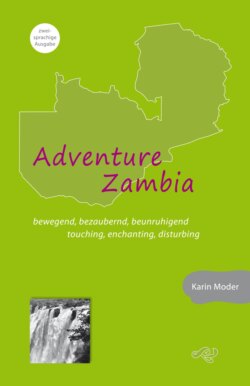Читать книгу Adventure Zambia - Karin Moder - Страница 12
ОглавлениеTouching, enchanting, disturbing. During my first visits Zambia appeared to me like a totally different world.
The real Africa
Everything is different here, especially outside the capital Lusaka. The land is vast, incredibly vast. There is no beginning and no end. The overall domineering Savannah does offer bushes, shrubs and even trees to the traveller’s eyes, however nothing like the density of central-European forests. What especially stuck in my mind, was the soil which is mostly dry and dusty, yet intense with its reddish sand colour. Here, land and soil are not simply marginal bye-products, they really are at the centre of life.
It is probably easier here for me to connect with Earth and feel my roots than it is in Germany and especially at home in Frankfurt.
Frankfurt – compared to Lusaka – is just a tiny village. Statistically, Frankfurt has around 650,000 inhabitants including suburbs as far and remote as the town of Hoechst. However, Lusaka most likely has 2 million inhabitants. Not that anyone would know for sure, and it doesn’t matter anyway. What matters, is the overall impression the city gives. It has always been really hard for me to imagine all those people, because Lusaka isn’t nearly as densely populated as a European city. Here, the buildings tend to be flat, multi-storey residential houses have remained an exception to date.
The few existing high-rise buildings are reserved for the likes of the United Nations headquarters, the Zambia National Bank or the national broadcasting channel ZNBC. Of course the international hotel chains such as “Holiday Inn” or “Intercontinental” also have established their Lusaka bases in prestigious multi-storey buildings, yet they don’t account for much considering the generous spaciousness of the city.
Generous spaciousness, that is something which certainly all rich people enjoy in Lusaka, and the so-called expats, too, who came here to work for charities, embassies or other Western organizations. Their residential houses and bungalows are built mostly on big properties. The walls around and the security guards however make up the other side of the coin.
Tight – and for our standards extremely cramped – living conditions will however be found in the so-called compounds, the shanty areas, where a 10 m2 room will easily provide shelter for up to six people. The compounds are all over the city, they ultimately determine the picture of the city. According to latest estimates, roughly 75% of Zambia’s inhabitants live in extreme poverty without running water and electricity supply – either in small villages in the bush or in the city compounds.
Zambia is actually ranked among the poorest countries in the world – no matter how this ranking is brought about. I was appalled when I first heard about this sad top position. Just think of how many countries there are on this Earth, including all the mini-states. And on this list, Zambia, this beautiful country of outstandingly peaceful people, is cornered on the bottom ranks concerning material wealth and development. Mind you, statistics do have their place, yet they leave room to ponder on what is important between the lines. The compounds may be omnipresent, still I’ve never found them as depressing as the sight of homeless people outside Frankfurt Central Railway Station. What makes the difference or am I just a master in repressing sights of misery?
Oddly enough I feel that the sun does make a difference. When it shines almost all day, endowed with such an intensity that white people are well advised to protect their scalps, a lot of what could be called misery, still has a certain shining.
And of course people do make a difference. I have met many people who in spite of adverse circumstances and repeated strokes of fate let themselves be carried by their faith in life and possibly in their creator. I have also met discontented people who passively waited for monetary funds given out by the white people’s aid organizations. One cannot deny this and due to the living conditions and the history of the continent it is quite understandable.
And finally I was able to meet a lot of cheerfulness especially among the kids in the compounds. I’m not quite sure if their enjoying themselves in the huge puddles after heavy rainfalls would further their health, probably it didn’t. Mind you, they seemed happy.
Frankfurt am Main, june 2005
